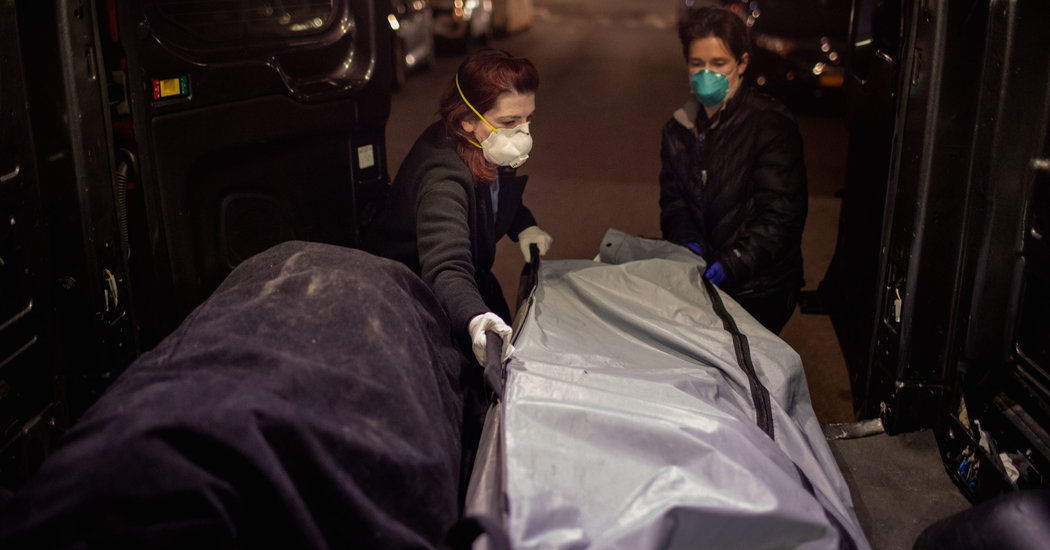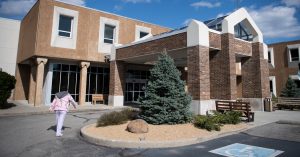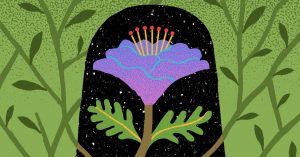It’s 8:30 p.m. and Sherry Bensimon, a funeral director at Riverside Memorial Chapels of New Jersey, in Hackensack, is still at work. A colleague who just returned from Hackensack University Medical Center tells her that the hospital’s refrigerated trailers, one of which arrived that day, were already at capacity. Each holds about 50 bodies — and that’s in addition to the hospital’s two morgues. “They’re full already?” Ms. Bensimon’s voice cracks. “Oh God.”
We talk a lot about the emergency medical workers and doctors and nurses whom we clap for every evening. But funeral directors are the last responders on the front lines — the people who come after someone has died. While they help families say their final goodbyes, funeral directors and their teams operate largely in the background. “We’re not a profession where we feel you need to recognize some of us,” said Vanessa Granby, 29, a director at Granby’s Funeral Service in the Bronx.
They’re vital to public health, but they’re also at high risk of exposure to the coronavirus. This week, BuzzFeed News reported that scientists in Thailand documented what they believe is the first instance of the virus’s transmission from the dead to the living, amplifying the conversation about the need to support those in the “death care” sector. Along with health care workers, they’re running short on personal protective equipment.
In hot spots from New York to Louisiana, funeral directors are overwhelmed and doing their best to adapt. They’re figuring out how to comfort mourning families from a distance. They’re working 12- to 15-hour days. Sandwiched between overflowing hospitals and backed-up cemeteries, funeral homes are at their maximum capacity, taking on double or even triple the number of families they might in an average week before the pandemic.
“We’ve become order takers, basically,” said Elysia Smith, 38, a funeral director at International Funeral Service of New York. “We’re trying to fill the order as fast as possible. It feels really impersonal.”
Funeral directors are people who feel compelled to serve. From the moment a family calls, directors guide them through the lengthy process of taking care of someone who has passed — removing the body, arranging memorials, organizing the cremation or burial, navigating the paperwork and consoling the families through their sorrow.
It’s a job built on trust and compassion in moments of immeasurable grief: Can I trust that you will take care of my loved one with dignity and reverence? Can I trust that you will honor the value and spirit my loved one brought to this world? Can I trust that you will help my family celebrate the meaning and love this person brought to our lives and to so many others?
“I feel really responsible when a family calls me,” Ms. Smith tells me. “I feel like I’m their voice.”
Now there are too many calls. There are too many deaths. There are too many families. And because space is limited, funeral homes are doing the unimaginable: turning families away. “It’s the total opposite of what we do,” Ms. Smith said.
Part of the job involves removing the deceased, which means going into people’s homes, nursing facilities, hospital morgues and, in some places, refrigerated units holding the bodies.
While they’d once wear work attire and gloves to do a removal, death-care employees are now suiting up with N-95 masks and Tyvek suits or plastic gowns, maybe even double layering their gloves. They’re disinfecting body bags with a germicidal spray before bringing them into the funeral home. Not all calls come in as confirmed Covid-19 cases, but funeral directors are practicing universal precautions, treating each case as if it might be infectious.
“It’s almost like we’re playing Russian roulette,” said Stephanie Simon, 56, an industry veteran with nearly 30 years of experience.
Ms. Simon works as an embalmer and director at Charbonnet Labat Funeral Home in New Orleans. She has started wearing a hazmat suit and a respirator when preparing a body. (Other embalmers are now working in similar gear.) With a confirmed Covid-19 case, among the riskiest things embalmers may do is remove the intubation tube, which can produce large but visible droplets that contain the virus.
For Ms. Simon, the pandemic reminds her of Hurricane Katrina. “That was a devastating time for us and changed the way we did our daily routine,” she said.
Rather than spending time with families face-to-face, getting to know them and their loved ones, directors are largely making arrangements by phone, Zoom or FaceTime. Paperwork is done electronically.
Most are organizing direct burials or cremations, with families postponing memorial services until stay-at-home orders are lifted. Some funeral homes still offer limited viewings for immediate family members only — one hour maximum, no more than 10 people, chairs staggered six or more feet apart. Live-streamed funerals are becoming more common.
Eric Friszell, 22, is a resident funeral director at the Nolan Funeral Home in Northport, N.Y., a position he has held since August. “It’s two major adjustments: It’s me coming out of school and into the field, and it’s adjusting to this whole new way of directing,” Mr. Friszell said. “I didn’t expect to be learning the ropes during a pandemic.”
Ayris Granby, Vanessa Granby’s aunt and the Granby’s home’s business manager, has been a funeral director for three decades. Many of those she serves are foreign-born New Yorkers who want to send their loved ones back home to countries like Jamaica, Guyana or Trinidad and Tobago. But that’s not a service she can provide right now: The logistics, from travel restrictions to the paperwork, make the request nearly impossible.
What pains Ms. Granby the most is not being able to do her job the way she knows best: through touch, which can’t be digitized.
“When you see someone hurting and you can’t reach out to comfort them,” she said. “I feel the loss more, because I can’t give more.”
In this time of social distancing, there’s something especially unnatural about not being able to embrace someone who’s suffering, her niece, Vanessa Granby, said. “Now it’s just words.”
Rituals are disappearing, too. Services at most churches, temples, synagogues and mosques have been suspended, and graveside farewells are increasingly restrictive.
Helon Rahman, 46, is the director and owner of the Rahman Funeral Home in Detroit. In a recent week, she conducted 15 services — double the normal. More than half were Covid-19 cases. While Ms. Rahman specializes in Muslim burials, she has also started serving other faiths. Non-Muslim funeral homes are unable to handle the flood of deaths, she said.
Islamic tradition calls for bodies to be washed before being shrouded and buried. But because of uncertainty around the virus, Ms. Rahman is instead performing the tayammum — purifying the bodies with something other than water. She puts dirt over the areas that are normally washed — feet, hands, face and head — all while the body is in a bag.
“I can count on my hand how many times I’ve done that in 10 years,” Ms. Rahman said. She performed it only in cases where a body was badly decomposed. “Now we are doing this several times a day,” she said. The funeral prayer, the Janazah, is a shadow of the communal action that it’s supposed to be.
Ms. Rahman recently oversaw a funeral where the Janazah was performed by a handful of people praying around a hearse pointed toward Mecca. The coffin remained in the vehicle.
“We can’t make the family happy,” she said. “We can’t allow them to be part of the rituals that they would normally be part of.”
For Ms. Bensimon, the director in New Jersey, her heart aches for all those she brings into her care whom she knows died alone. It’s not just the constant calls that keep her up at night.
“I’m worried that there won’t be enough of us to take care of the dead,” Ms. Bensimon said.
Alexandra E. Petri is on the editorial staff in Opinion.



















